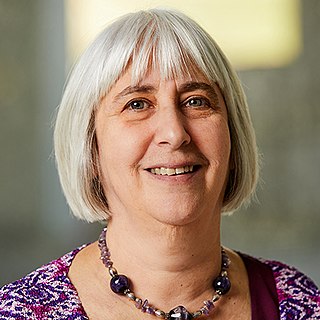The National Institute of Arthritis and Musculoskeletal and Skin Diseases (NIAMS) is one of the institutes and centers that make up the National Institutes of Health, an agency of the United States Department of Health and Human Services (HHS).
The University of Texas Southwestern Medical Center is a public academic health science center in Dallas, Texas. With approximately 13,568 employees and 2,445 faculty and over 2.7 million outpatient visits per year, UT Southwestern is the largest medical school in the University of Texas System and state of Texas.
Translational medicine (TM) is defined by the European Society for Translational Medicine (EUSTM) as "an interdisciplinary branch of the biomedical field supported by three main pillars: benchside, bedside, and community". The goal of TM is to combine disciplines, resources, expertise, and techniques within these pillars to promote enhancements in prevention, diagnosis, and therapies. Accordingly, translational medicine is a highly interdisciplinary field, the primary goal of which is to coalesce assets of various natures within the individual pillars in order to improve the global healthcare system significantly.
The American Association for Cancer Research (AACR) is the world's oldest and largest professional association related to cancer research. Based in Philadelphia, the AACR focuses on all aspects of cancer research, including basic, clinical, and translational research into the etiology, prevention, diagnosis, and treatment of cancer. Founded in 1907 by 11 physicians and scientists, the organization now has more than 42,000 members in over 120 countries. The mission of the AACR is to prevent and cure cancer through research, education, communication, collaboration, science policy and advocacy, and funding for cancer research.
A biomedical scientist is a scientist trained in biology, particularly in the context of medical laboratory sciences or laboratory medicine. These scientists work to gain knowledge on the main principles of how the human body works and to find new ways to cure or treat disease by developing advanced diagnostic tools or new therapeutic strategies. The research of biomedical scientists is referred to as biomedical research.

The Kolling Institute is located on the grounds of the Royal North Shore Hospital in St Leonards, Sydney Australia. The institute, founded in 1920, is the oldest medical research institute in New South Wales.

Sree Chitra Tirunal Institute for Medical Sciences & Technology (SCTIMST), Trivandrum, is an Institution of National Importance established by an Act of Parliament in 1980. It is under the Department of Science and Technology, Government of India, with an Institute Body and a Governing Body constituted as per the provisions of the Sree Chitra Tirunal Institute for Medical Sciences & Technology, Trivandrum, Act, 1980. The Institute presents a unique model by connecting the different strands of Clinical Medicine, Biomedical Technology and Public Health to produce a seamless continuum of indisputable relevance to society.

The Cambridge Biomedical Campus is the largest centre of medical research and health science in Europe. The site is located at the southern end of Hills Road in Cambridge, England. Over 20,000 people work at the site and is home to a number of organisations including: Cambridge University Hospitals NHS Foundation Trust, Royal Papworth Hospital NHS Foundation Trust, AstraZeneca's headquarters, Abcam, the Wellcome Trust, Cancer Research UK, the university's medical school, the UK government's Medical Research Council and has National Institute for Health Research Biomedical Research Centre status. It is an accredited UK academic health science centre.

The Centre for Neuroscience and Cell Biology (CNC) is a nonprofit research institute founded in 1990, aiming to foster research in biomedicine and biotechnology and multidisciplinary graduate teaching at the University of Coimbra. CNC was the first established “Laboratório Associado” in Portugal, and it has steadily increased the scope of scientific competences over the years, with a strong focus on the exploitation of the fundamental mechanisms of ageing and brain diseases.
Rudi Balling is a German geneticist. He is the founding director of the Luxembourg Centre for Systems Biomedicine at the University of Luxembourg (2009-2021) He has served as President of the International Mammalian Genome Society and as co-editor of the Annual Review of Nutrition since 2018. In 2016 Balling received Luxembourg's Ordre de Mérite (Commandeur) from Prime Minister Xavier Bettel.
Translational research is research aimed at translating (converting) results in basic research into results that directly benefit humans. The term is especially used in In science and technology, especially in biology and medical science. As such, translational research forms a subset of applied research.
Bagadilico, Basal Ganglia Disorders Linnaeus Consortium, is a research group in Lund, Sweden, and a Linnaeus environment, supported by the Swedish Research Council. The group consists of about 120 researchers at either Lund University or Lund University Hospital.

The International Clinical Research Centre at St. Anne’s University Hospital in Brno (FNUSA-ICRC) is a next-generation research and development center that focuses on finding new methods, technologies and medicines used to prevent, diagnose and treat cardiovascular and neurological diseases and disorders such as heart failure, coronary syndromes, hypertension, cardiac arrhythmia, sleep apnea, stroke, dementia and Alzheimer’s disease. Such diseases are among the leading diseases and causes of death in modern society.

Biomedical sciences are a set of sciences applying portions of natural science or formal science, or both, to develop knowledge, interventions, or technology that are of use in healthcare or public health. Such disciplines as medical microbiology, clinical virology, clinical epidemiology, genetic epidemiology, and biomedical engineering are medical sciences. In explaining physiological mechanisms operating in pathological processes, however, pathophysiology can be regarded as basic science.
Translational bioinformatics (TBI) is an emerging field in the study of health informatics, focused on the convergence of molecular bioinformatics, biostatistics, statistical genetics and clinical informatics. Its focus is on applying informatics methodology to the increasing amount of biomedical and genomic data to formulate knowledge and medical tools, which can be utilized by scientists, clinicians, and patients. Furthermore, it involves applying biomedical research to improve human health through the use of computer-based information system. TBI employs data mining and analyzing biomedical informatics in order to generate clinical knowledge for application. Clinical knowledge includes finding similarities in patient populations, interpreting biological information to suggest therapy treatments and predict health outcomes.
Systems medicine is an interdisciplinary field of study that looks at the systems of the human body as part of an integrated whole, incorporating biochemical, physiological, and environment interactions. Systems medicine draws on systems science and systems biology, and considers complex interactions within the human body in light of a patient's genomics, behavior and environment.
Institute for Medical Research, Israel-Canada (IMRIC) is a research institute affiliated with the Faculty of Medicine of the Hebrew University of Jerusalem.

Lim Kah Leong, is a Singaporean neuroscientist and tenured full Professor and Vice Dean (Research) at the Lee Kong Chian School of Medicine, Nanyang Technological University (Singapore), where he is also a President's Chair Professor in Translational Neuroscience. He is concurrently the Research Director for Biomedical and Life Sciences at NTU, and the Coordinating Director of NTU Integrated Medical, Biological and Environmental Sciences (NIMBELS). He was previously Chair of the Department of Physiology at the National University of Singapore, Singapore and the deputy director for research at the National Neuroscience Institute, Singapore. Dr. Lim is known for his research in Parkinson's Disease. His research focuses on unraveling the molecular mechanisms underlying neurodegenerative diseases, with the view to develop novel therapies aimed at effectively treating the disease.

Ellen Sidransky is an American pediatrician and clinical geneticist in the Medical Genetics Branch of the National Human Genome Research Institute. She is chief of the Molecular Neurogenetics Section.
The University of Glasgow’s Glasgow Precision Oncology Laboratory (GPOL) is a molecular research facility that partners with the UK’s NHS and industry to perform research into the development of novel therapeutic strategies, the creation of pan-cancer genomic assays and provide knowledge transfer for healthcare systems to enable them to develop landscapes for therapeutic testing in cancer.








